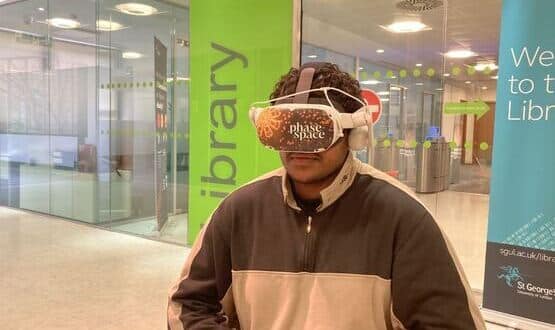Somerset NHS Foundation Trust introduces VR training
- 17 August 2021

Somerset NHS Foundation Trust has introduced virtual reality (VR) training to improve learning amongst its junior doctors and medical students.
In collaboration with Virti, the trust has introduced a VR headset and hand-held controllers where users can be immersed in virtual operations to gain an understanding of the skills they need to develop for real-life situations.
The technology means the students and junior doctors have the opportunity to learn how to explain diagnoses and treatment plans, manage challenging situations and engage with patients and their families.
This type of learning is designed to complement, not replace, real-life training. One of the key benefits is that it removes the need for students to attend the hospital, which has been vital during the pandemic. VR simulations can also be more impactful and memorable for students compared to traditional methods of learning, as they are scalable, repeatable and immersive.
Dr Alex Aquilina, ST3 registrar in trauma and orthopaedics, said: “Last year I was awarded a Health Education England simulation fellowship to collaborate with Virti to create immersive learning content. As part of this, I have been developing simulations of surgical procedures using 360-degree cameras.
“And more recently, we have been delivering VR simulations of surgical procedures to trauma and orthopaedic registrars across the Severn network as part of our weekly remote teaching, alongside traditional lecture-based presentations. The virtual simulations allow teaching to be delivered to trainees providing an overview of the whole surgical process, from setting up equipment and prothesis, to briefing colleagues and positioning the patient correctly.”
VR driving better patient interactions
Colorectal consultant for the trust, Richard Bamford, added: “The sky really is the limit with this type of technology. We’re currently working with Virti on the human factors and soft skills side of things to get a better understanding of how people interact with each other, including teamwork and leadership in a theatre setting.
“We are looking at how we can follow a patient journey and what influences the decisions we make. That’s not just about our knowledge and skill level but also how we interact with our colleagues around us in the theatre environment. One example of how this technology may work well is in teaching medical professionals how to better break bad news to families by enhancing good communication skills.”
The trust hopes that in the future the training can be embedded with augmented reality elements which would lead learners down different filmed routes based on their given answers.
It’s not the first time the NHS has turned to virtual reality technology; though usually it is aimed at the patients. Last year saw Norfolk and Suffolk Foundation Trust use VR headsets to help patients with phobias, while also launched in 2020 was Oxford VR’s social engagement program which uses a VR setting with CBT techniques to help patients overcome social anxiety.



